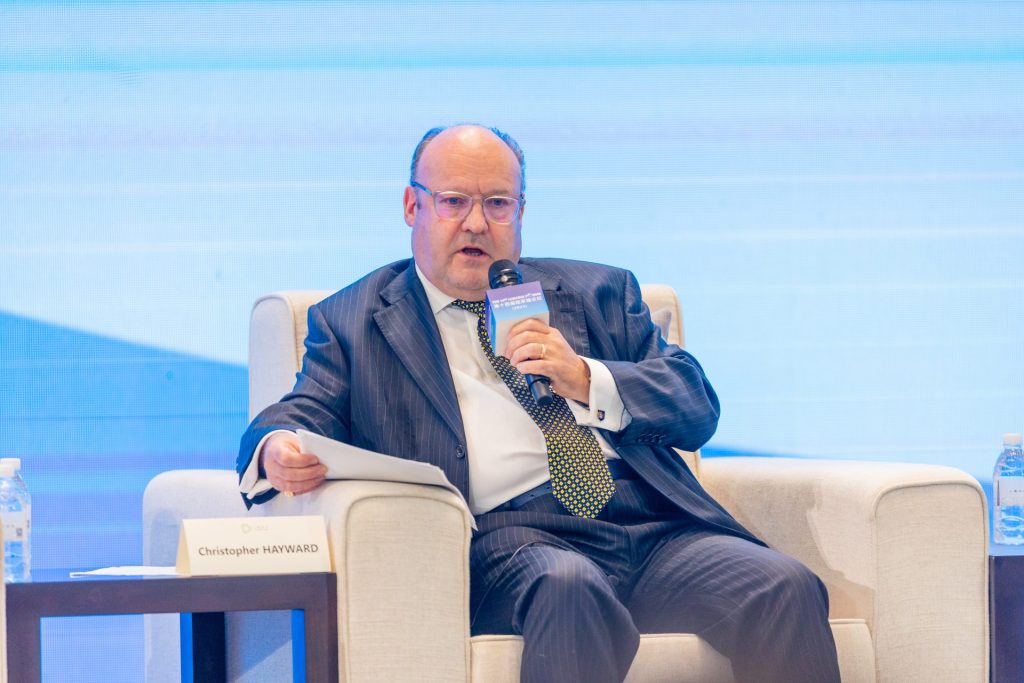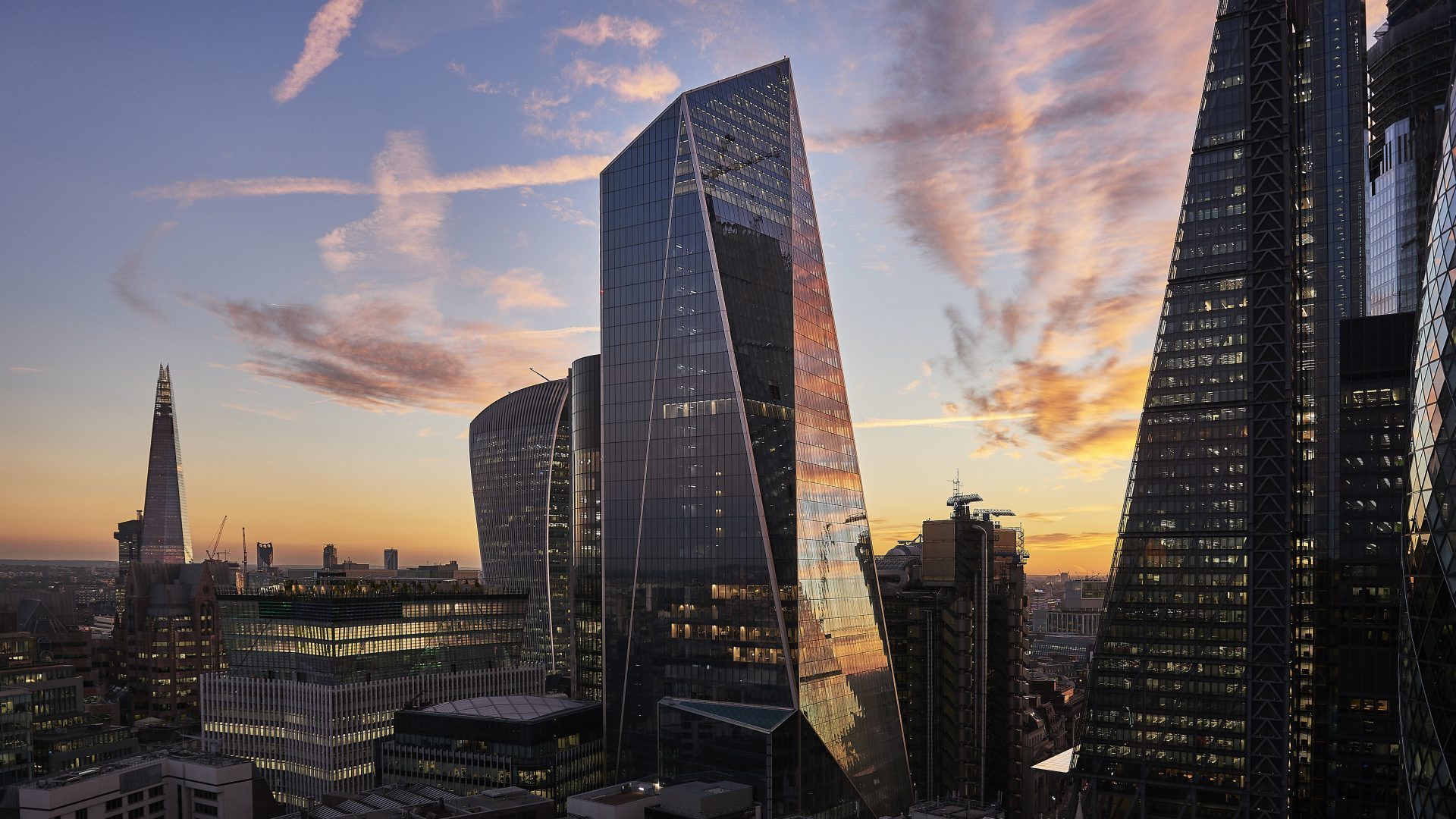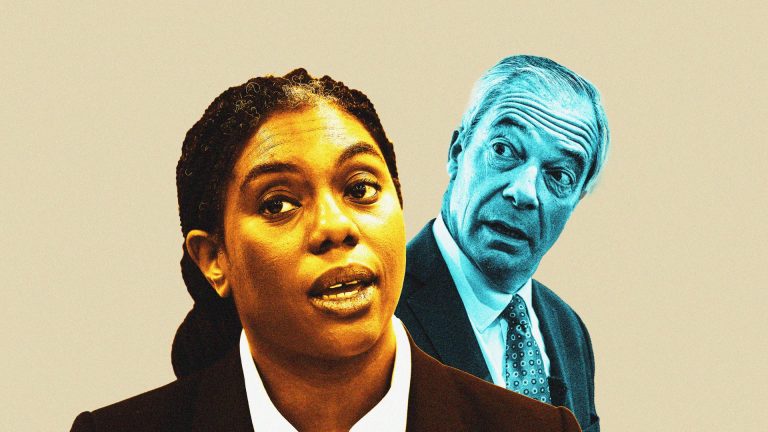Christopher Hayward is the leader of the City of London Corporation, in effect the council which governs the Square Mile, except he isn’t. His business card – charmingly, he still has one – says “Policy Chairman”, the arcane term the 956-year-old body’s leader goes by.
All members are technically independents, “so they all say, well, by definition you can’t have a leader,” explains Hayward as we sit in the City’s Guildhall, where the Corporation is based. (The body has 125 members – for context, the Welsh Parliament has 60. Hayward himself was a Conservative when deputy leader of Hertfordshire and Dorset councils.)
We are speaking because as leader – he describes himself as prime minister to the Lord Mayor’s monarch – he has been in charge of cooperating with the EU post-Brexit. We meet not long after he travelled to Brussels for the first time since the signing of the Windsor Framework, which adjusted the operation of the Northern Ireland Protocol and eased tensions. But, as he says, things remain uneasy.
“I suppose the first thing I’d say is it’s been a long and painful divorce, really, the UK and the EU,” he says.
“And it really has been, because of the time it took to get the Brexit bill through. Look, I was a Remainer. I may as well be on the cards about that, and I was very worried around the time of the Brexit vote that we would lose tens of thousands of jobs to Europe and it would have a huge impact on our financial services sector.
“Now, what I can tell you is that it has not been as bad as some of us feared. We lost as a sector, across the United Kingdom, some 7,000 jobs in total. Mainly banks, mainly down in Canary Wharf, passporting [the system allowing firms in any EU or EEA state to trade freely in any other], ending up in Ireland or Paris, but we didn’t lose as many jobs as we thought. And of course, on the opposite side of the fence new jobs are being created because European financial institutions have wanted to open an office in London. So there’s been a bit of a quid pro quo, really, in terms of jobs. So that side of things, I think, has settled down. The fastest growth, to be fair, is coming from the technology sector rather than the FPS [financial and professional services] sector at the moment.”
As with any council leader, part of Hayward’s job is to accentuate the positive. But he clearly regrets Brexit and its effects on the City, and welcomes some recent positive developments.

“The Windsor Framework was very important for me because we have a City of London office in Brussels, and there’s seven or eight people there, and I have not been able to talk to the Commission at all, because the Commission would not speak to me pre- the Windsor Framework.” he says.
“Now we’ve had the Windsor Framework, we’ve signed an MoU [memorandum of understanding] on financial services with the EU, had the first meeting on that. And there are issues that are common to both parties, the EU and the UK, that we do need to debate. So I can pick out things like AI, I can pick out things like green finance, these are all issues which we need, wherever we can, to mirror regulation, right? Because AI knows no borders, for example. So I’ve been out to see the Commission. I’ve had my first meeting with the Commission two months ago.
“It’s really important that we rebuild that relationship. If I’m honest, trust has been destroyed. Or it’s at a very low ebb, let’s call it that. Not destroyed, a very low ebb between the United Kingdom and the EU. That is going to take a long time to rebuild and we have to keep working at that. Because there were a lot of harsh things said, as you well know, by British politicians.”
Even though the UK is out of the single market, he says, “it’s important to make the point that, you know, a strong EU trading with a strong UK is still in everybody’s interests”.
“I mean we trade with the EU day in and day out, we always will whether we’re in it or we’re out of it, but we now have a global stage that’s become even more important to us to exploit. And we’re trying to do that, with free trade agreements, and we have moved on from some of the challenges.
“But I do believe what the new foreign secretary has said is right, that we need to work closely with Europe, we need to rebuild our relationship with Europe, even though we’re out of the single market.” (Little more than an hour after our interview concludes, Rishi Sunak accused Keir Starmer of “back[ing] Brussels over Britain” by meeting the prime minister of Greece.)
A review of the UK-EU Trade and Cooperation Agreement is due to start in May 2026, the first of the five-yearly assessments agreed when it was signed. Will the City be arguing for change, for example, extending agreements over trade to cover financial and professional services?
“We’ll always try to speak for the sector and therefore we’ll make those arguments,” says Hayward.
“You know, we are a convening power here in the Corporation. We bring together the financial and professional services sector, but what I would say about that is, you know, we are non-party political here. So we work with whatever government we’ve got. Now there could be a change of government in a year’s time. We believe that, whoever forms the next government, the biggest challenge will be economic growth. How do you get economic growth into what has been a stagnant UK economy for the past 15, 16 years. And that’s relevant whether it’s Labour, Conservative or any other party that forms the government.”
Was the City listened to enough by the government as it negotiated the original Brexit agreement?
“I suppose I’d have to say clearly not, in the sense that we didn’t get included in the Brexit bill,” he says. “We made the case and clearly, for whatever reasons, other areas took priority. But I don’t want to look back, because we can’t undo what happened. I want to look forward to say ‘where do we go from here and how do we rebuild?’. Yeah, we didn’t get everything we wanted, we did make the arguments for equivalence [the EU’s system to grant market access to non-member state firms in certain areas of financial services], we did make the arguments for financial services being in the Brexit bill.” He points out that financial services contributes 13% of the total tax take: “a huge contribution, massive”.
Financial services, I muse, seemed to attract much less public discourse than fishing, which in 2021 made up 0.03% of the British economy and directly employs around 11,000 people (the Financial Times pointed out back in 2018 that fishing made a smaller economic contribution to UK GDP than the Harrods department store). But then maybe for the Conservatives’ new Red Wall voters, fishing is a real job done by real people.
“Well, let me assure you there are real people doing real jobs in the City of London,” says Hayward.
“I don’t want to comment on any individual sector. You’re quite right, there was much more of a focus on goods, there was much more of a focus on agriculture, much more of a focus on fishing. You’re right. And I don’t think the financial services sector had a big enough recognition in the Brexit debate. That’s not that we didn’t put the case – we did put the case, very strongly. But… there seemed to be more interest in some of these other areas. You know, I’m not in government, I can’t speak for why the government reached the decision they did. We are where we are.”
Hayward was, and is, an unabashed Remainer. Unhappily for New European readers, however, he remains pessimistic about the chances of returning any time soon.
“I personally don’t see it – I’m not saying it won’t happen, I’m just saying at the moment I don’t see that. I think you will find, across the British political parties, different emphases, depending on the party, on how closely we should or shouldn’t work with the EU. That’s inevitable because every party has a slightly different approach.
“I think all parties broadly now realise that the pain of the Brexit parting is over and we’ve now got to work together. But that’s a big jump from there to say ‘will we go back into the customs union, will we go back into the EU?’. I don’t think we will in my lifetime, but never say never. I mean, it’s a political world. Something could happen, events change everything.
“I think now we just need to get on. We’re outside, we’ve got a regulatory structure, we’ve got opportunities. Personally I’d have preferred to have seen those opportunities still within the EU, but we’re not so we’ve got to move forward.”











